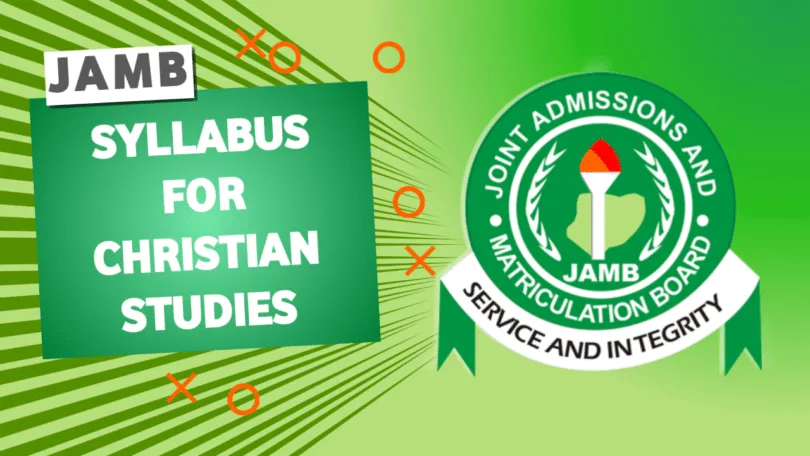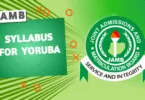The JAMB Syllabus for CRS for the 2026/2027 Unified Tertiary Matriculation Examination (UTME) serves as a comprehensive guide for candidates preparing to know the depths of Christian teachings, biblical narratives, and moral principles.
This syllabus is designed to give students a solid foundation in the Christian faith, promoting not only academic knowledge but also spiritual and ethical growth. By focusing on key topics from the Old and New Testaments, it aims to develop candidates’ abilities to interpret scriptures, apply biblical lessons to contemporary issues, and appreciate the historical and cultural contexts of Christianity.
The overall objectives of the JAMB Syllabus for CRS include instilling a sense of reverence for God, promoting moral uprightness, and encouraging critical thinking about faith in society.
Candidates are expected to demonstrate competence in recalling biblical events, analyzing their implications, and relating them to modern life.
The syllabus is structured into sections covering major biblical periods and themes, ensuring a balanced coverage of doctrinal, historical, and ethical aspects.
Studying this syllabus diligently will help aspirants score high in the UTME, paving the way for admission into tertiary institutions where CRS can lead to careers in theology, counseling, education, and community leadership.
With the 2026/2027 UTME approaching, it is important to focus your preparation with these outlined topics. This JAMB syllabus emphasizes understanding over rote memorization, urging students to engage with recommended texts and practice past questions.
This guide provides a detailed breakdown of the topics, subtopics, and objectives to streamline your study plan. By mastering these areas, you will not only excel in the exam but also deepen your personal faith journey.

JAMB Syllabus for CRS
JAMB Syllabus for CRS 2026/2027
Section A: The Old Testament
This section focuses on the foundational narratives of the Hebrew Bible, highlighting God’s covenant with humanity, the formation of the Israelite nation, and early leadership. It covers themes from creation to the establishment of the monarchy, emphasizing lessons on obedience, faith, and divine justice.
- The Creation and the Fall of Man Candidates should understand the account of creation in Genesis 1-2, including the roles of God, humanity, and nature. Key subtopics include the creation of the world in six days, the Garden of Eden, the temptation by the serpent, and the consequences of sin (Genesis 3). Objectives: To explain the doctrine of sin and its impact on human-divine relations; to discuss the promise of redemption.
- The Patriarchs: Abraham, Isaac, and Jacob Explore the call of Abraham (Genesis 12), the covenant at circumcision (Genesis 17), the sacrifice of Isaac (Genesis 22), and Jacob’s life including his dream at Bethel and reconciliation with Esau (Genesis 27-33). Objectives: To analyze the theme of election and promise; to identify characteristics of faith exemplified by the patriarchs.
- Joseph and the Family of Jacob Study Joseph’s dreams, betrayal by brothers, rise in Egypt, and reunion with his family (Genesis 37-50). Objectives: To highlight themes of providence, forgiveness, and God’s sovereignty in human affairs.
- The Exodus and the Law Cover the oppression in Egypt, the call of Moses, the plagues, the Passover, the crossing of the Red Sea, and the giving of the Ten Commandments at Sinai (Exodus 1-20). Subtopics include the role of Aaron and the covenant at Sinai. Objectives: To describe liberation as a divine act; to outline the moral and ceremonial laws.
- The Wilderness Experience and Entry into the Promised Land Discuss the journey through the wilderness, the golden calf incident, the spies’ report, and Joshua’s leadership in conquering Canaan (Exodus 32; Numbers 13-14; Joshua 1-6). Objectives: To evaluate the consequences of rebellion; to appreciate the fulfillment of God’s promises.
- The Period of the Judges Examine the cycle of apostasy, oppression, and deliverance through judges like Deborah, Gideon, and Samson (Judges 4-5, 6-8, 13-16). Objectives: To identify the role of judges as God’s instruments; to discuss recurring themes of faithfulness.
- The United Kingdom: Saul, David, and Solomon Cover the establishment of the monarchy, Saul’s reign and rejection, David’s rise, his reign including the Davidic covenant (2 Samuel 7), and Solomon’s wisdom and temple building (1 Kings 1-11). Objectives: To trace the transition from judges to kings; to explore themes of leadership and divine favor.
- The Divided Kingdom Study the division after Solomon (1 Kings 12), the reigns of kings like Ahab and Jehoshaphat, and the ministry of Elijah and Elisha (1 Kings 17-19; 2 Kings 2-6). Objectives: To analyze the causes of division; to highlight prophetic confrontations with idolatry.
Section B: The Old Testament Continued (From Division to Prophets)
This section extends the historical narrative, focusing on the divided kingdoms, exile, and prophetic messages that call for repentance and restoration.
- Israel and Judah: Kings and Prophets Discuss the northern kingdom’s fall to Assyria (2 Kings 17), southern kingdom’s kings like Hezekiah and Josiah, and prophets Amos and Hosea (Amos 1-9; Hosea 1-3). Objectives: To explain social justice in prophetic oracles; to contrast faithful and unfaithful leadership.
- The Fall of Jerusalem and the Exile Cover the Babylonian invasion, fall of Judah (2 Kings 24-25), and life in exile. Objectives: To discuss the theology of judgment and hope.
- The Return from Exile and Post-Exilic Prophets Examine the decrees of Cyrus, rebuilding the temple under Zerubbabel, Ezra’s reforms, and Nehemiah’s wall (Ezra 1-6; Nehemiah 1-6). Include prophets Haggai, Zechariah, and Malachi. Objectives: To highlight restoration and renewal; to identify eschatological themes.
Section C: The New Testament
This section delves into the life of Christ, the early church, and apostolic teachings, emphasizing salvation, discipleship, and Christian living.
- The Four Gospels The Birth and Early Life of Jesus (Matthew 1-2; Luke 1-2): Annunciation, birth, and presentation in the temple. Ministry of Jesus (Mark 1-3; Matthew 5-7): Calling disciples, Sermon on the Mount, miracles like healing the sick and feeding multitudes. Teachings and Parables (Luke 10-15; John 10): Good Samaritan, prodigal son, vine and branches. The Passion and Resurrection (Matthew 26-28; John 18-21): Last Supper, crucifixion, empty tomb. Objectives: To outline the kingdom of God; to apply parables to ethical living.
- The Acts of the Apostles Cover Pentecost, Peter’s sermons, conversion of Saul, spread of the gospel to Gentiles (Acts 1-5, 9-10, 13-15, 16-20). Objectives: To trace the Holy Spirit’s role; to discuss church growth and persecution.
- The Epistles Pauline Epistles: Themes of justification (Romans 3-5), love (1 Corinthians 13), fruit of the Spirit (Galatians 5), and armor of God (Ephesians 6). General Epistles: Faith (James 1-2), endurance (1 Peter 1-5), warnings (2 Peter; Jude). Objectives: To explain salvation by grace; to promote Christian virtues in community.
- The Book of Hebrews and Revelation Hebrews: Superiority of Christ (Hebrews 1-10). Revelation: Visions of heaven and judgment (Revelation 1-3, 21-22). Objectives: To affirm Christ’s priesthood; to inspire hope in eschatology.
READ ALSO: JAMB Recommended Textbooks For Christian Religious Studies 2026
FAQs
How many questions are typically asked from the CRS syllabus in the UTME?
JAMB usually sets 50 objective questions for CRS, drawn proportionally from the three sections, with emphasis on key themes and passages.
Are there specific Bible versions recommended for the syllabus?
The Revised Standard Version (RSV) or New International Version (NIV) is commonly referenced, but candidates should use any standard translation for comprehension.
Can I use the 2025 syllabus for 2026 JAMB preparation?
Yes, the core content remains consistent year to year, though minor updates may occur. Always check for the latest official version.
What study tips do you recommend for CRS?
Read the Bible passages daily, summarize themes in notes, discuss with study groups, and solve past questions to understand question patterns.
How does CRS contribute to my total UTME score?
As one of four subjects, it carries 100 marks (50 questions at 2 marks each), influencing your aggregate score for admission.
Are there practical components in the CRS exam?
No, it is entirely multiple-choice, focusing on knowledge, comprehension, and application.
What if I miss a topic during preparation?
Prioritize high-weightage areas like the Gospels and Pauline Epistles, but aim for balanced coverage to avoid surprises.
Drop your comments below for me to answer them as quickly as possible.





